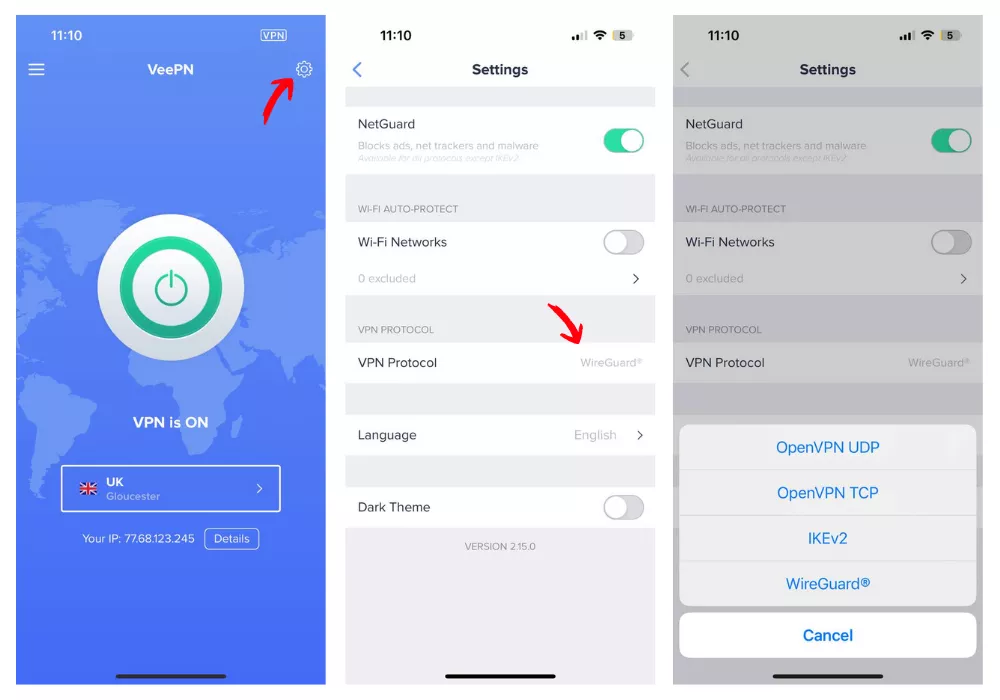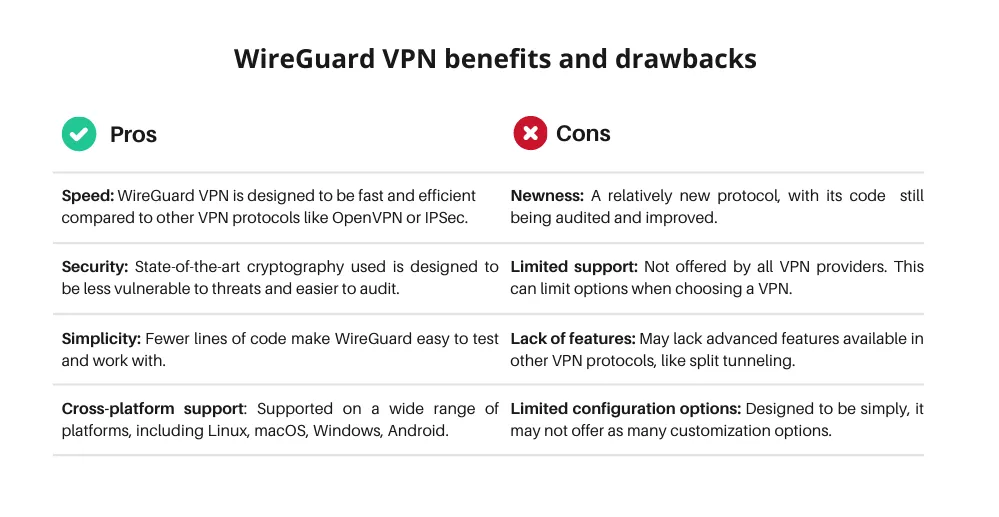Considering WireGuard VPN: Is It the Best VPN Protocol for Your Needs?
Looking for a VPN protocol that is fast, secure, and easy-to-use connectivity? You might have heard then WireGuard VPN. With the help of strong cryptographic algorithms and much easier network setups, WireGuard VPN is rapidly becoming one of the best options for privacy and security online. But what is this protocol exactly and how does it work? Read along to find out.

What is WireGuard VPN?
Launched in 2018, WireGuard VPN is a open-source implementation of a VPN protocol designed to be a “faster, simpler, leaner” and a more secure alternative to traditional VPN protocols such as OpenVPN, IPSec, and PPTP. First introduced as a Linux Kernel implementation, WireGuard is easily portable between operating systems and works on a few major ones, including Windows, macOS, Android, and iOS.
Note: Wondering what protocol do you need? Check our guide on how to choose a VPN protocol.
WireGuard is already regarded as one of the best options in the VPN industry. It has advanced cryptography, fast speeds, and is easy to set up as it has fewer lines of code (4,000 lines of code compared to OpenVPN’s hundreds of thousands).
Is WireGuard a VPN? How to use this VPN protocol
WireGuard is a VPN protocol that virtual private network apps and services can use to create secure and private network connections. There also are WireGuard client apps for a variety of operating systems. You can use them to connect to a VPN server which supports the WireGuard protocol. However, note that these apps allow you to configure and control your VPN connections based on the WireGuard protocol but they don’t allow you to get the VPN service.
How to use WireGuard protocol
WireGuard is relatively new protocol for VPNs and hence not all VPN providers might provide it yet. If you want to have a go at WireGuard VPN in a convenient, easy to use VPN then go with VeePN. Our application is supported by WireGuard on the most popular operating systems such as iOS, Android, macOS and Windows. Easily select and change VPN protocols in the settings.

WireGuard benefits and drawbacks
WireGuard seems to be all the rage. Famous tech and programming personalities, like Linus Torvalds, who is the inventor of Linux operating system, praised this protocol on the Linux Kernel mailing list as being a “work of art” compared to its older counterparts. So, why exactly does it stand out? And what are its disadvantages (as there surely are some)? Let’s find out.
WireGuard VPN pros

👍 Speed. Designed to be fast and efficient, WireGuard VPN uses fast cryptography code. When receiving data, WireGuard uses predetermined configurations and fewer resources.
👍 Security. WireGuard uses smart, modern cryptographic primitives with secure defaults. Its fewer (4,000) lines of code also mean a lesser attack surface to find flaws in. Besides, WireGuard is easier to audit as compared to other VPN protocols.
👍 Simplicity. WireGuard’s smaller codebase makes it easy to test and work with.
👍 Cross-platform support. WireGuard VPN works on many different platforms like Linux, Mac, PC, Android and IOS which makes it a good VPN option.
WireGuard VPN cons
👎 Newness. WireGuard VPN is a fairly new protocol and the code is still being audited and improved. So it may not be as well tested and trusted as other more established VPN protocols.
👎 Limited support. Not all VPN service providers are WireGuard compatible and this could be a drawback that may cost you in terms of selection and choice while using a VPN service.
👎 Lack of features. While WireGuard VPN is simple and efficient, it may not have some of the advanced features present in other VPN protocols, such as multi-hop routing, split tunneling, etc.
👎 Limited configuration options. WireGuard VPN is designed to be simple and easy to use, which means that it may not have as many customization and configuration options as other VPN protocols.
How does WireGuard work?
The WireGuard VPN protocol is unique in its security approach. Unlike other protocols, it doesn’t require establishing security configurations between the client and server because they are already predefined. This makes the connection faster as there is no need to connect or reconnect to the server.
In order for WireGuard to work, all you need are your and server keys, stored in a simple client configuration file, which are exchanged using NoiseIK from the noise protocol framework in a single round trip and then bound to a WireGuard interface, so this minimal configuration file is enough for most setups. But as an everyday user, you are not expected to worry about the technical stuff – the VPN app that provides you with the WireGuard protocol will take care of everything for you.
Is WireGuard secure?
Yes, WireGuard is considered to be a secure VPN protocol, and the protocol’s security model was designed to be simple, auditable, and modern. It uses the most modern cryptography algorithms for the creation of an encrypted tunnel between two devices which is based on the usage of symmetric encryption.WireGuard’s simplified codebase and easy design also means that it is less vulnerable to security vulnerabilities and easier to audit than other VPN protocols.
The current WireGuard version uses the following set of algorithms:
- ChaCha20 for symmetric encryption
- Poly1305 for authentication using RFC7539’s AEAD construction
- Curve25519 for key exchange
- BLAKE2s for hashing and keyed hashing
- SipHash24 for hashtable keys
- HKDF for key derivation
- UDP as the Transport Layer protocol
- Perfect Forward Secrecy (PFS) to protect user data
Note: Learn more about WireGuard’s technical details on their website.
But note that the security of your VPN connection is also dependent on the security measures implemented by your VPN providers, so it is really important to choose a reputed one that prioritizes user privacy and security.
Now, with WireGuard roaming the VPN industry, let’s find out, whether it’s indeed a better alternative to two major players on the market – OpenVPN and IPSec / IKeV2.
Is WireGuard better than OpenVPN and IKeV2?
WireGuard, OpenVPN and IKEv2 are all secure VPN protocols that strengths and weaknesses exist between them. To put it briefly:
WireGuard is a new version and is getting a lot of attention because it is faster, much simpler codebase and much simpler implementation.
OpenVPN is a widely-used VPN protocol that is more than 20 years old. It’s known for being flexible, multi-platform and providing top security features It makes use of customized encryption algorithms and can be set to run on TCP or UDP Ports, which makes it more compatible with firewall and router. I
PSec/IKEv2 is known to be stable and fast on connection speeds. It’s commonly used on mobile devices because of its ability to reconnect to VPN servers quickly when connected to one network or the other.
WireGuard vs OpenVPN vs IKeV2
Let’s compare them head-to-head.

While such comparisons are helpful they don’t necessarily tell the whole story. Many things can influence how fast and how well VPN protocols are able to work, for example, the speed of your Internet connection, how busy the VPN servers are, how well your device is able to work with the VPN software and how far away you are from the VPN server. Nevertheless, here are the standard “best uses” of each protocol:
| VPN protocol | Use it best for |
|---|---|
| WireGuard | Streaming media and playing games due to outstanding speeds |
| OpenVPN | Making payments, using a public Wi-Fi network, or dealing with sensitive data |
| IPSec/IKeV2 | Mobility — when you need to quickly change the Wi-Fi network to mobile data |
Even though the WireGuard protocol seems to be operating better than OpenVPN or IKEv2, it doesn’t necessarily mean that it will operate better for you specifically. The best thing you can do is to see which protocol works the smoothest for you is to try them all out with a single VPN app. VeePN offers you all the popular VPN protocols on all the major operating systems and lets you easily switch between them in the settings.
Is WireGuard VPN right for you? Find out with this simple checklist (with some help from us)
- Does the VPN company I am thinking about using WireGuard VPN as an option? (Yes, VeePN has WireGuard for iOS, Android, Windows, MacOS and Linux).
- Does WireGuard work with my devices and platforms that I want to use with my VPN (Windows VPN, macOS, iOS, Android, Linux, router VPN and so on.)?(Yep, all are supported).
- Does WireGuard provide faster speed compared to other VPN protocols? (Yes, designed to be fast and efficient, WireGuard makes use of the predetermine and lesser resources).
- Is Wireguard easy to install and use-even by non technological people? (Yes, as long as go with an easy to use VPN service provider that supports WireGuard like VeePN)
- Does WireGuard provide me with strong encryption and other security protections against my information and privacy? (Yes, WireGuard is using smart and modern crypography primitives).
- Does WireGuard provide Perfect Forward Secrecy for the case that someone had to gain access to my encryption key that they would not be able to decrypt my past or future VPN traffic? (Yep, PFS is provided).
- Does WireGuard has any known vulnerabilities or security issues which I must know? (Not anything that we know about yet).
- Does the VPN provider have a 24/7 customer support, in case I need any help in my wireguard vpn setup or usage? (Sure thing! VeePN provides 24/7 customer assistance through live chat or email).
- Is WireGuard VPN cheap and affordable to me? (VeePN has three subscription plans with the 5-year plan being the best one with its 85% off!).
- Does WireGuard VPN have the specific needs and requirements that I have – unblocking GEO restricted content, using Torrent, online banking services secured etc? (Yes, VeePN offers servers in 89 locations in the world, so you can access any content that you need. It also uses AES-256 encryption which gives your sensitive data the best protection).
Wrapping up on WireGuard VPN
WireGuard VPN is a newer, much better performing and safer VPN protocol to look into. With the aid of the latest cryptographic algorithms and fewer lines of code, it provides a simple and concise VPN experience.
Want to see for yourself how well WireGuard works? Give VeePN a try. Just pick WireGuard as your VPN protocol in settings, and our app will handle the rest. Choose your subscription plan (all backed up by a money-back guarantee) and try it out yourself risk-free.
FAQ: What Is WireGuard VPN?
Yes, WireGuard is said to be a decent VPN protocol that comes with a faster speed as well as security and ease to implementation when compared to many other VPN protocols.
WireGuard & OpenVPN are both safe VPN protocols with their weaknesses. WireGuard is newer and popular for its faster speeds and simplified codebase, whereas OpenVPN is known for being flexible and has strong security features.Find their comparison in this blog post.
WireGuard VPN works with providing a tunnel that is both secure and encrypted between your device and the VPN server. It has helped cryptographic algorithms to progress and also Perfect Forward Secrity to make sure your data and your privacy is safe. Find out more in our blog post.
WireGuard can use any UDP port, but it uses port 51820 by default.
Yes, WireGuard is believed to be a safe and secure VPN protocol. It was designed keeping simplicity, performance and security in mind and has been audited and reviewed in term of security. The fact that the protocol was primarily incorporated into the Linux kernel is a testament of its security and stability.
However, as with any VPN protocol, the overall security of a VPN service depends on how well the VPN provider implemented and configured it. So, if you’re considering using a WireGuard VPN, go for a reputable and trustworthy provider with a strong commitment to security and privacy.
No software is truly completely immune to hackers. However, WireGuard has been audited for security and has been designed to be less susceptible to certain kinds of attacks compared to other VPN protocols because of advanced cryptographic algorithms and a simpler codebase, meaning there are fewer chances of it having coding errors and vulnerabilities. The security of WireGuard as a VPN service is also reliant on the extent of its implementation and configuration done by the VPN provider.
While some free VPN providers offer WireGuard services, most of the respectable providers of VPN services both charge subscription to use their WireGuard servers. Better not to risk your privacy and use a reliable VPN.
VeePN is freedom
Download VeePN Client for All Platforms
Enjoy a smooth VPN experience anywhere, anytime. No matter the device you have — phone or laptop, tablet or router — VeePN’s next-gen data protection and ultra-fast speeds will cover all of them.
Download for PC Download for Mac IOS and Android App
IOS and Android App
Want secure browsing while reading this?
See the difference for yourself - Try VeePN PRO for 3-days for $1, no risk, no pressure.
Start My $1 TrialThen VeePN PRO 1-year plan






